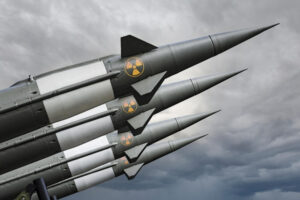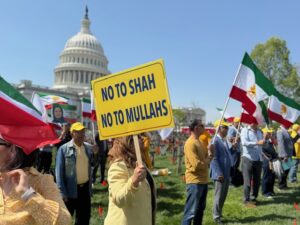Even in our “advanced” age of artificial intelligence, Plato continues to provide lessons for us. The ancient Greek philosopher argues famously in The Republic that politics and statecraft are only a reflection of what is real. Accordingly, what we now accept as national defense and national security subject matter is often just “shadow.”
What then are the underlying human values and behaviors that combine to produce war, defense and perpetually belligerent geopolitics? To distinguish any true geopolitical reality from mere shadows of such reality, three basic concepts should be examined in Jerusalem and Washington. These concepts are death, time and immortality.
Power over death represents the ultimate human reward for political compliance or religious submission. Today, this issue is especially animating or even determinative in the Middle East. When American and Israeli strategists think about the incomparable attractions of power over death, they are thinking about individual flesh-and-blood human beings — the jihadist terrorist.
But analytic explorations of the enemy suicide-bomber (the microcosm) should be expanded to include an enemy state as a whole (the macrocosm). In present day circumstances, it is entirely conceivable that Iran would at some point act as an individual suicide-bomber writ large. This hypothetical point could be one that for Iran is post-nuclear, after it obtains a nuclear weapon.
For Israel and the United States, that would be a very big problem.
On occasion, the search for power over death could demand a violent and faith-confirming end to a terrorist’s life on earth. As we may plainly note from jihadist combatants in the current Gaza war and its several antecedents, this ultimate sacrifice would be identified by the individual criminals as “martyrdom.”
But the jihadist who allegedly welcomes death is actually seeking to avoid death. This is because the death that he (or she) expects to suffer is merely a transient inconvenience on the path to eternal life. There is nothing heroic about the terrorist who loves death. Rather, it is this individual murderer’s overwhelming and cowardly fear of death that causes him to commit suicide and kill others in the process. The hideous paradox is not easily understood by the intellectually faint-hearted, but it is primary to understanding, nonetheless.
A terrorist doctrine that doesn’t bode well for a ceasefire
In more broadly philosophical terms – and not just as a direct matter of Israeli and American counter-terrorism — the Hamas or Hezbollah killer/torturer steeply perverts what Basque philosopher Miguel de Unamuno had earlier called “the hunger for immortality.”
The doctrine-based Hamas or Hezbollah search for power over death bodes inauspiciously for any “humanitarian cease fire” or codified “peace.” Terrorists are not interested in a cessation of hostilities with Israel, nor are they interested in Palestinian statehood when the presumed rewards of martyrdom seem vastly greater. The jihadist terrorist’s loudly proclaimed hopes for a Palestinian state are just a “shadow” of what is really uppermost in his mind. This always-highest preference is immortality or power over death.
From the standpoint of Israeli counter-terrorist operations, understanding the overriding attractions of martyrdom to terrorist calculations should become increasingly primary to defense and national security planning.
Ominously, an insatiable terrorist hunger for immortality can oblige the killing and torture of variously designated “unbelievers,” “heathen,” “Jews,” “Crusaders,” “apostates,” etc. By definition, whatever special circumstances of “sacrifice” may be involved in any jihadist terror attacks, reason gives way to unreason. Furthermore, as we should already know from a long and bitter world history, any such surrender would ultimately offer the terror-criminal a gateway not to immortality, but to ritualistic slaughter.
The animating quest for immortality
Back in the nineteenth century, German historian Heinrich von Treitschke observed: “Individual man sees in his own country the realization of his earthly immortality.”
The same ominous links between individual immortality and the deified state are discoverable in current world politics, most conspicuously among anti-Israel and anti-American terror organizations. Understanding such links, it follows, should become an integral part of Israeli and American counter-terrorist planning.
To deal more satisfactorily with the interrelated horrors of national and global politics, Israeli and American planners will first have to recognize the true underpinnings of these terrorist and other geopolitical dangers. They are rooted in complex conceptual intersections of death, time and immortality. They are not rooted in any political or juridical hopes for a Palestinian state alongside Israel. This is abundantly clear with the visceral Palestinian chants of “from the river to the sea” and “by any means necessary,” which are merely sanitized calls for a war of annihilation against Israel, self-defiling calls for the crime of genocide.
For jihadist terrorists and potentially for jihadist mentoring states such as Iran the promised power over death requires the sacrifice of certain expressly despised others, such as Israelis and Americans. The dignified human task should not necessarily be to remove individual hopes of soaring above death (that is, to achieve some palpable form of immortality), but to “de-link” such a futile search from incessantly destructive terrorist behaviors.
There is no satisfying a criminal threat
Two additional forces of global power struggle are also in play. They are meaning and belonging. They represent other true images of universal politics – images additional to immortality or “power over death” – that bestow personal or collective feelings of self-worth and membership. Once again, however, the associated national security problem is that such feelings are not necessarily benign. Per humankind’s perpetually murderous history, they could also elicit war, terrorism and/or genocide. Again, the Palestinian chants for their own state — “from the river to the sea” and “by any means necessary” — are invitations to genocide.
In the final analysis, Hamas, Hezbollah and state-mentor Iran are shadows of what constitutes the true jihadist terror threat. Among other things, no Israeli surrender of allegedly “occupied lands” could ever satisfy the desire for meaning and belonging, nor could it be enough to limit or remove this criminal threat.
Even if Israel were to agree to a particular Palestinian state, this agreement would fall short of the enemy’s overriding desire for “martyrdom” (Hamas’ true or unreflected reality). Though this jihadist desire is delusional on its face, it still represents a primary source of national security harms to both Israel and the United States.
Counter-terrorist policymakers in Israel and the United States, please take note. Shadows can sometimes hide the true source of terror crimes.







